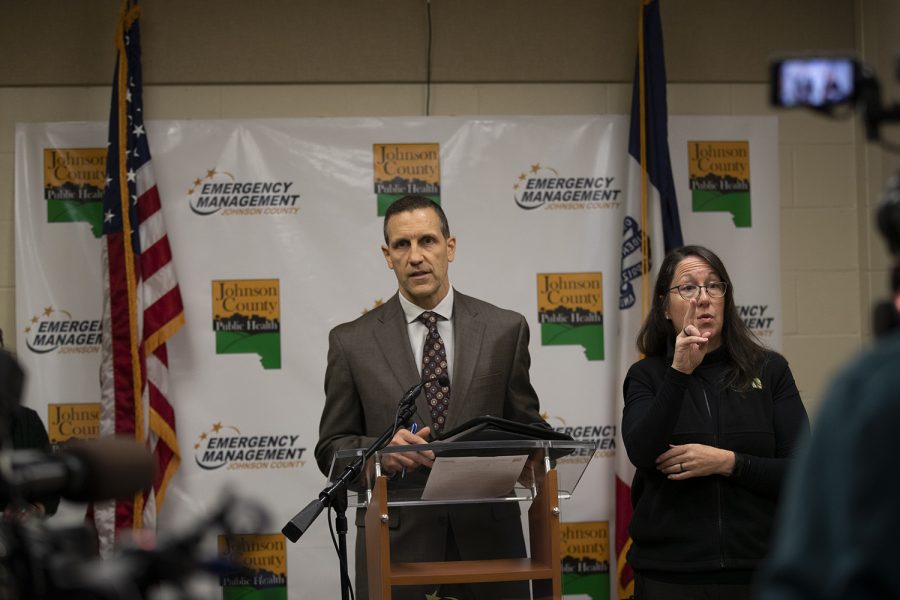Six new cases of COVID-19 confirmed in Iowa, three more in Johnson County
Johnson County officials urged residents to remain cautious but calm as Iowa’s cases of coronavirus tick upward.
Johnson County Public Health Director Dave Koch speaks during a press conference about COVID-19 at the Joint Emergency Communications Center on Thursday, March 12, 2020.
March 17, 2020
An additional six confirmed cases of COVID-19 in Iowa have brought Iowa’s total up to 29 positive cases, according to a release from the Office of Iowa Gov. Kim Reynolds.
According to the Iowa Department of Public Health, three of the individuals are residents of Johnson County, bringing Johnson County’s total to 18. The three other individuals who tested positive live in Adair, Black Hawk, and Dallas counties.
Information regarding the condition of the individuals and whether or not these cases were the result of community spread or travel outside the U.S. has not been released. In a press conference on Monday, Reynolds said that due to more national labs conducting testing, the Iowa Department of Public Health would not be able to share information about the case other than the county the individual resides in.
Previously, Reynolds had shared details relating to the source of the infection. In announcing the first three Iowa coronavirus cases, Reynolds said they were connected to travel aboard a cruise in Egypt.
According to a statement from the Office of the Governor on Sunday recommending Iowa K-12 schools close for four weeks, the state expects the number of positive cases of COVID-19 in Iowa to increase with the emergence of expanded testing options. One of the cases involving evidence of community spread in Iowa was the first Iowa test conducted by a national lab.
In a press conference Tuesday hours before the governor confirmed the additional Iowa cases, Johnson County officials urged residents to be cautious, but to remain calm.
Dave Wilson, Johnson County Emergency Management director called for people of Johnson County to be “problem solvers.”
“What we don’t need and what’s not productive and not helpful is people running around acting like chickens with their heads cut off,” Wilson said. “The sun will come up tomorrow. The majority of people do survive this. It is highly lethal to a segment of the population.”
He asked for non-essential medical services not in operation, such as dentist offices ceasing routine cleaning, to donate medical supplies to local hospitals and emergency operations centers facing a shortage of personal protective equipment, such as masks, gloves, as well as cleaning supplies.
University of Iowa Hospitals and Clinics and Mercy Hospital in Iowa City in the last week have both signaled that their facilities are taking steps to conserve protective equipment for an expected strain due to treating patients with the coronavirus.
In an email to UIHC employees and Carver College of Medicine Students March 12, UIHC said Carver students would be restricted from operating rooms or other situations where they would need equipment in order to conserve supplies.
Mercy Hospital Director of Communications Margaret Reese said Tuesday that hospital officials there “feel reasonably good about supplies at this time.”
“And we are conserving our resources,” Reese added. “So, making sure people are using the appropriate PPE or personal protective equipment for the appropriate procedures and not using things inappropriately that we might need later on.”
Wilson said that although Iowans shouldn’t take undue risks, people should also help those with critical jobs — for example, helping a health care worker with children by offering to look after their kids while schools are closed.
“The last thing we want is a nurse, or somebody that’s not able to come to work because they simply don’t have something to do with their kids,” Wilson said. “Their kids don’t have a place to go. So the nurse can’t report to work. The kids don’t have a place to go. So dad can’t report to the jail or to patrol or answer the 911 calls.”
The coronavirus is mainly transmitted through respiratory droplets, said Johnson County Public Health Director Dave Koch. He added that because the virus is easily transmitted, it’s essential for people to pay attention to social distancing. Public health officials recommend keeping at least six feet between people, and limiting group sizes to less than 10.
The public health department mans a hotline dedicated to questions about the coronavirus. The public can call 211 to access it.
Managing Editor Sarah Watson contributed to this report.



